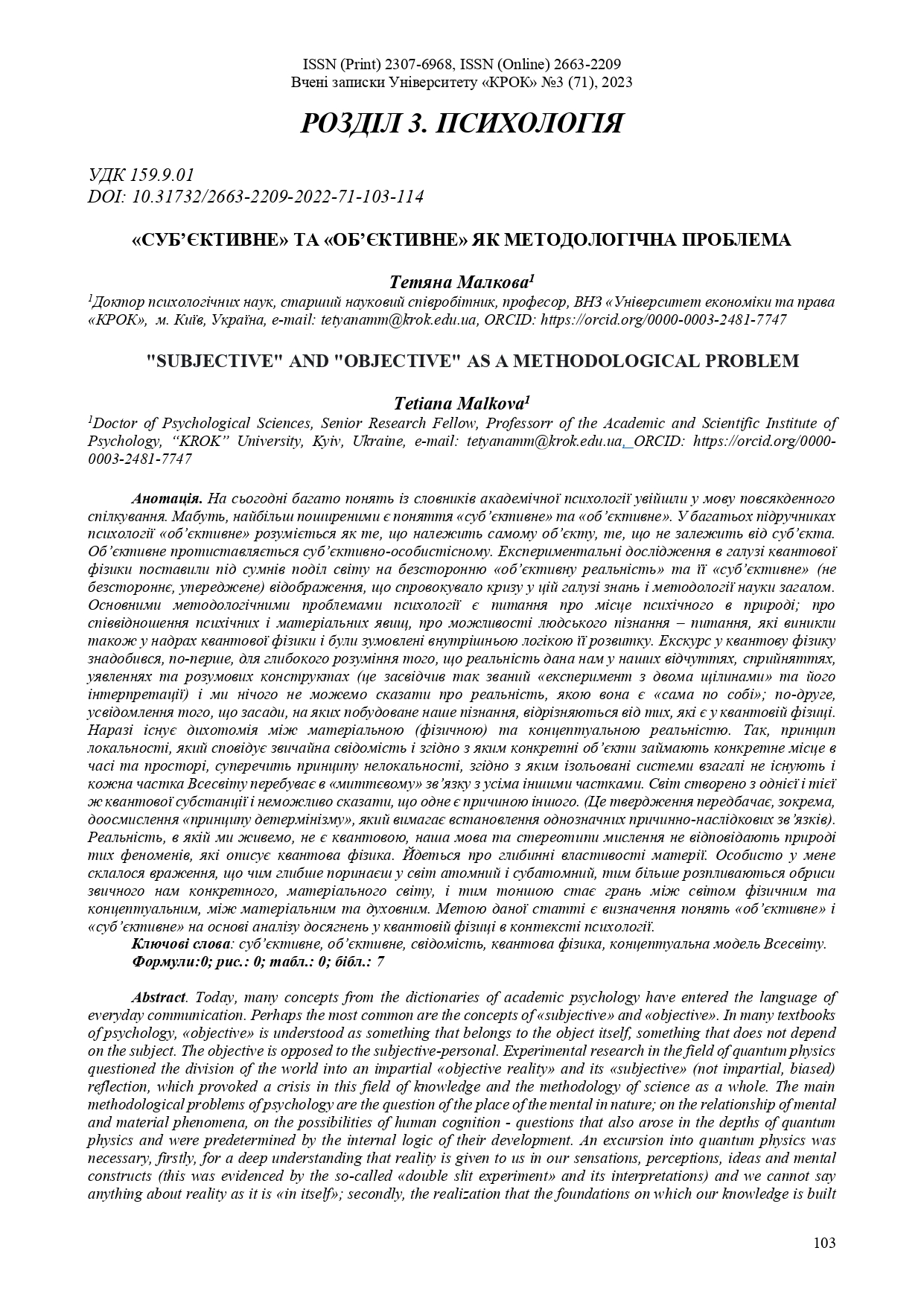"SUBJECTIVE" AND "OBJECTIVE" AS A METHODOLOGICAL PROBLEM
DOI:
https://doi.org/10.31732/2663-2209-2022-71-103-114Keywords:
subjective, objective, consciousness, quantum physics, conceptual model of the UniverseAbstract
Today, many concepts from the dictionaries of academic psychology have entered the language of everyday communication. Perhaps the most common are the concepts of «subjective» and «objective». In many textbooks of psychology, «objective» is understood as something that belongs to the object itself, something that does not depend on the subject. The objective is opposed to the subjective-personal. Experimental research in the field of quantum physics questioned the division of the world into an impartial «objective reality» and its «subjective» (not impartial, biased) reflection, which provoked a crisis in this field of knowledge and the methodology of science as a whole. The main methodological problems of psychology are the question of the place of the mental in nature; on the relationship of mental and material phenomena, on the possibilities of human cognition - questions that also arose in the depths of quantum physics and were predetermined by the internal logic of their development. An excursion into quantum physics was necessary, firstly, for a deep understanding that reality is given to us in our sensations, perceptions, ideas and mental constructs (this was evidenced by the so-called «double slit experiment» and its interpretations) and we cannot say anything about reality as it is «in itself»; secondly, the realization that the foundations on which our knowledge is built differ from those in quantum physics. Currently, there is a dichotomy between material (physical) and conceptual reality. Thus, the principle of locality, which professes ordinary consciousness and according to which specific objects occupy a specific place in time and space, contradicts the principle of non-locality, according to which isolated systems do not exist at all and every particle of the universe is in «instantaneous» communication with all other particles. The world is created from the same quantum substance and it is impossible to say that one is the cause of the other. (This statement implies, in particular, a rethinking of the «principle of determinism» which requires the establishment of unambiguous causal relationships). The reality in which we live is not quantum, our language and stereotypes of thinking do not correspond to the nature of the phenomena described by quantum physics. It is about the deep properties of matter. Personally, I got the impression that the deeper you plunge into the world of atomic and subatomic, the more the outlines of the specific, material world familiar to us become blurred and the thinner the line between the physical and conceptual world, between the material and the spiritual becomes. The purpose of this article is to define the concepts of "objective" and "subjective" based on the analysis of achievements in quantum physics in the context of psychology.
Downloads
References
Квантовий світ. URL: https://www.youtube.com/watch?v=jedGM1_MhuI Д Дата звернення 7.09.2023.
Becker, A. (2018). What is real? The unfinished quest for the meaning of quantum physics. Great Britain. John Murray. 370 p.
Jung, C.G. (2010). Synchronicity: An Acausal Connecting Principle. (From Vol.8. of the Collected Works of C.G. Jung) (Jung Extracts). Princeton University Press. 160 p.
Lanza, R. and Berman, B. (2009). Biocentrism: How Life and Consciousness are the Keys to Understanding the True Nature of the Universe. Writers House
LLC and Synopsis Literary Agency. 256 p.
McBratney, L., Onyett, N., Ward, A. (2015). Series Editor: Adrian Beard. AQA English Literature A. A Level and AS. United Kingdom: Oxford University Press. 215 p.
Toffler, A. (1990). Powershift: Knowledge, Wealth and Violence at the Edge of the 21st Century. United States.Bantam Books. 585 p.
Walker, M. (2004). English Literature. AS. Letts Educational. 143 p.

Downloads
Published
How to Cite
Issue
Section
License

This work is licensed under a Creative Commons Attribution-NonCommercial 4.0 International License.

